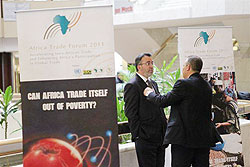Addis Ababa- At the just concluded African Trade Forum (ATF) 2011, Non-Tariff Barriers (NTBs) and bureaucracy were cited as major obstacles to trade between African countries, while regional integration was singled out as the way to go if Africa is to trade its way out of poverty. The high level forum, the first of its kind, which was organized by the United Nations Economic Commission for Africa (UNECA) and the African Development Bank (AfDB), was concluded with a call to African countries to commit to removing trade barriers and improving trade amongst them.


Addis Ababa- At the just concluded African Trade Forum (ATF) 2011, Non-Tariff Barriers (NTBs) and bureaucracy were cited as major obstacles to trade between African countries, while regional integration was singled out as the way to go if Africa is to trade its way out of poverty.
The high level forum, the first of its kind, which was organized by the United Nations Economic Commission for Africa (UNECA) and the African Development Bank (AfDB), was concluded with a call to African countries to commit to removing trade barriers and improving trade amongst them.
The three-day meeting which brought together over 400 people from across the globe, touched a number of crosscutting issues affecting trade on the continent, and what African countries can do to improve trade, because, despite its vast resources, the continent still lags behind in global trade.
While the major debate was whether the US and Europe can open up markets and be ready to engage with Africa rather than arm twisting it to sign the Doha agreement, African countries were faulted for not investing more in value addition, preferring instead to export primary resources and raw materials.
The forum which was moderated by renowned Kenyan TV personality, Jeff Koinange, and BBC Ghanaian news anchor, Komla Dumor, mapped out ways how the continent can enhance trade and regional integration by removing barriers that affect movements of goods between countries.
In the wake of the Eurozone crisis and a fast growing Asian market, it was observed that it was now time for Africa to take its place on the global trade pedestal, with a call for African countries to embark on a new trade oriented model that will make the continent competitive and have a say on global trade.
In his remarks AfDB’s Lamin Barrow who represented the continental bank at the forum, said African countries need to come up with concrete proposals that will not only expand intra Africa trade, but also increase the continent’s participation in global trade.
"The unfolding events in the Eurozone and other emerging threats, both perceived and real, that might lead to global economic slowdown provide a compelling urgency for further reflection to shape a new vision of Africa’s economic diplomacy through enhanced intra-Africa trade and regional integration,”
"While the continent might not be under immediate threat from the direct consequences of these challenges, our reliance on primary commodity exports makes it impossible to escape the medium to long-term impacts---the more reason we should boost intra African trade,” Barrow noted.
The UN Under Secretary General and Executive Secretary of the Economic Commission for Africa, Abdoulie Janneh, said that while Africa needs to diversify its productive base and invest more in value addition, the continent remains affected by the lack of progress in the Doha Round of trade negotiations and the continent needs a development friendly international trade regime to fully benefit.
He, however, noted that the continent can reap more benefits from trade between its own countries, which now stands at a lowly 11% compared to Europe where intra trade stands at 72% and 52% in Asia, hence Africa needs to create regional value chains that will boost intra Africa trade, if the continent is to trade its way out of poverty.
Dr. Tabitha Kiriti Nganga from the University of Nairobi tabled a discussion on Non-Tariff Barriers in the East African Community, with a call to the partner states to commit to reducing barriers, physical and non physical that continue to hamper trade between them.
Among the major barriers cited are several weigh bridges that exist between Mombasa, Kigali and Bujumbura which cause unnecessary delays for goods in transit, noting that countries should work on a harmonized plan to weigh trucks at entry points.
EAC partner states were also urged to computerize systems at the border posts to ensure efficiency and also root out corruption which remains rampant in several partner states.
"Customs officials, police officers and other public agencies involved in goods clearance, issuance of certificates of confirmation, permits and so on, that accept or solicit for bribes should be prosecuted and sacked from those positions,” Dr. Nganga recommended.
EAC partner states were also called on to fast track processes to harmonize documentation procedures and road transportation systems and policies which continue to frustrate trade.
edmund.kagire @newtimes.co.rw
Ends


